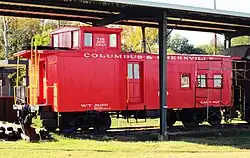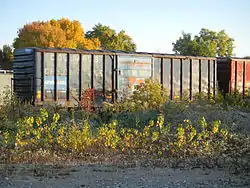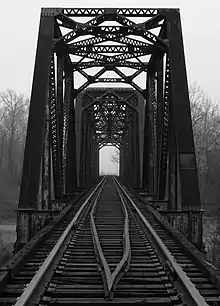Columbus and Greenville Railway
There have been two uses of Columbus and Greenville Railway, both for the same rail line.
 CAGY Caboose on display in Columbus, Mississippi | |
| Overview | |
|---|---|
| Headquarters | Columbus, Mississippi |
| Reporting mark | C&G |
| Locale | Mississippi |
| Dates of operation | 1923–1972 |
| Predecessor | Southern Railway in Mississippi |
| Successor | Illinois Central Gulf Railroad |
| Technical | |
| Track gauge | 4 ft 8+1⁄2 in (1,435 mm) standard gauge |
 | |
 Columbus and Greenville Railway boxcar on the CRANDIC at Cedar Rapids, Iowa | |
| Overview | |
|---|---|
| Headquarters | Columbus, Mississippi |
| Reporting mark | CAGY |
| Locale | Mississippi |
| Dates of operation | 1975–present |
| Predecessor | Illinois Central Gulf Railroad |
| Technical | |
| Track gauge | 4 ft 8+1⁄2 in (1,435 mm) standard gauge |
| Length | 162 miles (261 km) |
Original Columbus and Greenville
The first Columbus and Greenville Railway (reporting mark C&G) was formed by the sale of the Southern Railway operated Southern Railway in Mississippi, to local interests. In January 1952, the CAGY retired its last steam locomotive, Baldwin 4-6-0 Ten-Wheeler #304 built in 1904.[1] It continued independent operations until 1972 when it was bought by the Illinois Central Gulf Railroad.
Present Columbus and Greenville
The second Columbus and Greenville Railway (reporting mark CAGY) was founded in 1974 and began operations in 1975 over divested Illinois Central Gulf Railroad trackage across the state of Mississippi. Its terminals, as the name implies, are Columbus and Greenville, Mississippi.

In 2001, CAGY suspended service over 89.5 miles (144 km) of track between West Point and Greenwood due to a washout. This action split the line in two. The western section operates between Greenville and Greenwood with an interchange with Canadian National in Greenwood. The eastern section operates the remaining trackage from West Point onwards.
The company once specialized in transporting wood and paper products to and from local factories. The company's traffic base has expanded to include bricks, plastic products, feed grains for catfish and swine, finished and raw steel, and biodiesel as well as cotton and rice products. The company runs six trains a day, two between Greenwood and Greenville, two out of Columbus and two at the Severcorr steel mill between Columbus and Artesia.
The majority owner of the Columbus and Greenville is CAGY Industries, which also owns the Luxapalila Valley Railroad and the Chattooga and Chickamauga Railway.
CAGY Industries was purchased by Genesee & Wyoming Inc. in June, 2008. GWRR is still operating the sections of rail between Greenville and Greenwood, and between West Point and Columbus.[2]
Preservation
Several pieces of CAGY equipment have been preserved and put on display:
- Baldwin locomotive #601 is on display in front of the Columbus & Greenville shops in Columbus, MS.
- Baldwin locomotive #606 "City of Moorhead" is on display at the Illinois Railway Museum.
- Caboose #500 is on display in Winona, MS next to the train depot downtown.
- Caboose #503 is on display in Propst Park in Columbus, MS along with some C&G passenger coaches and a GM&O steam locomotive.
- Caboose #506 is in downtown Kosciusko, MS.
- Caboose #508 is in front of a doctor's office in Greenwood, MS.
C&G Rail Trail Coalition
The C&G Rail Trail Coalition was formed in early 2008 with the goal of converting the abandoned section between Greenwood and West Point into a rail trail.[3] Their effort was almost immediately put on hold when the line was purchased by Genesee & Wyoming Inc., who had no interest in abandoning the line at that point. Efforts restarted when GWRR approached the Coalition in February, 2022. [4]
As of April, 2023, the Coalition is being assisted by the Mississippi Hills National Heritage Area and various municipalities along the route. They are working to acquire funding and develop preliminary plans for purchasing and converting the abandoned line to a usable trail. Some rural landowners crossed by the rail line are fighting the development.
See also
References
- "CAGY Industries Information". Archived from the original on 2009-05-07. Retrieved 2005-12-15.
- "Columbus and Greenville Railway Information". Archived from the original on 2005-12-31. Retrieved 2005-12-15.
- Lewis, Edward A. (1986). American Shortline Railway Guide (3rd ed.). Milwaukee, Wisconsin: Kalmbach Publishing Company. p. 62. ISBN 0-89024-073-6.